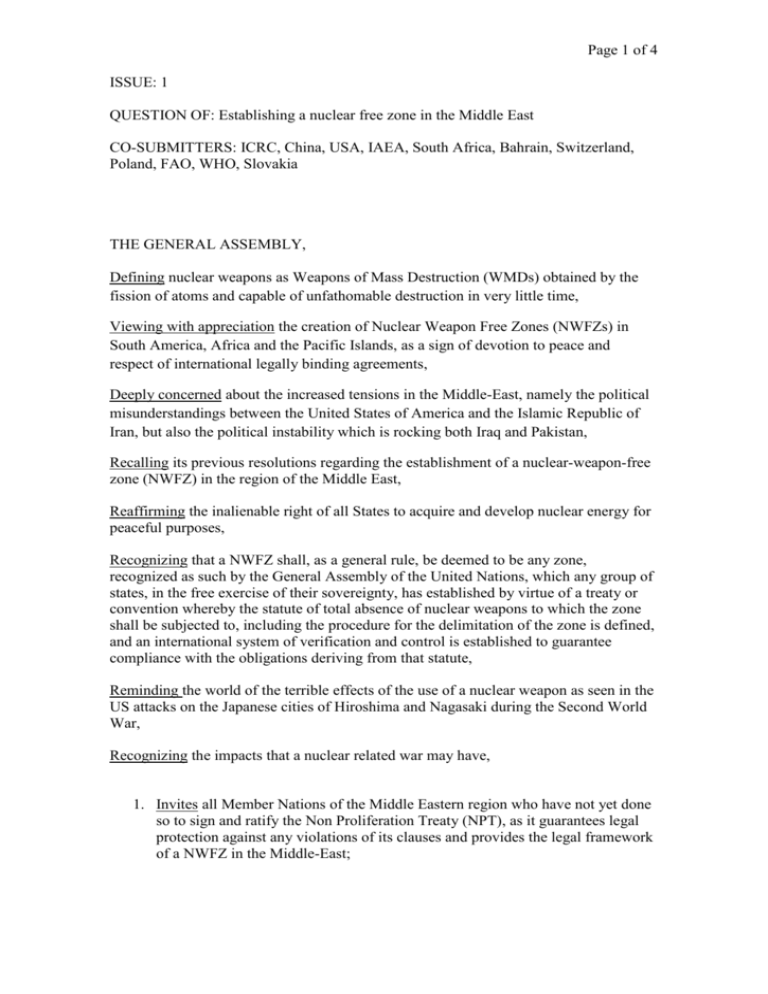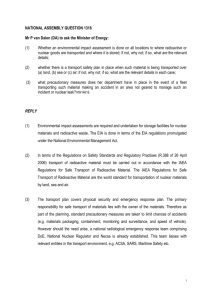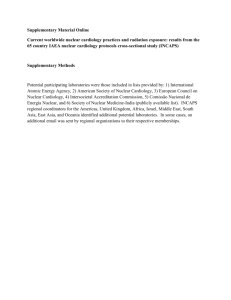GA Issue 1
advertisement

Page 1 of 4 ISSUE: 1 QUESTION OF: Establishing a nuclear free zone in the Middle East CO-SUBMITTERS: ICRC, China, USA, IAEA, South Africa, Bahrain, Switzerland, Poland, FAO, WHO, Slovakia THE GENERAL ASSEMBLY, Defining nuclear weapons as Weapons of Mass Destruction (WMDs) obtained by the fission of atoms and capable of unfathomable destruction in very little time, Viewing with appreciation the creation of Nuclear Weapon Free Zones (NWFZs) in South America, Africa and the Pacific Islands, as a sign of devotion to peace and respect of international legally binding agreements, Deeply concerned about the increased tensions in the Middle-East, namely the political misunderstandings between the United States of America and the Islamic Republic of Iran, but also the political instability which is rocking both Iraq and Pakistan, Recalling its previous resolutions regarding the establishment of a nuclear-weapon-free zone (NWFZ) in the region of the Middle East, Reaffirming the inalienable right of all States to acquire and develop nuclear energy for peaceful purposes, Recognizing that a NWFZ shall, as a general rule, be deemed to be any zone, recognized as such by the General Assembly of the United Nations, which any group of states, in the free exercise of their sovereignty, has established by virtue of a treaty or convention whereby the statute of total absence of nuclear weapons to which the zone shall be subjected to, including the procedure for the delimitation of the zone is defined, and an international system of verification and control is established to guarantee compliance with the obligations deriving from that statute, Reminding the world of the terrible effects of the use of a nuclear weapon as seen in the US attacks on the Japanese cities of Hiroshima and Nagasaki during the Second World War, Recognizing the impacts that a nuclear related war may have, 1. Invites all Member Nations of the Middle Eastern region who have not yet done so to sign and ratify the Non Proliferation Treaty (NPT), as it guarantees legal protection against any violations of its clauses and provides the legal framework of a NWFZ in the Middle-East; Page 2 of 4 ISSUE: 1 QUESTION OF: Establishing a nuclear free zone in the Middle East CO-SUBMITTERS: ICRC, China, USA, IAEA, South Africa, Bahrain, Switzerland, Poland, FAO, WHO, Slovakia 2. Proposes that all Middle Eastern nations that are currently producing nuclear devices to be used in military affairs to promptly cease the production of these devices; 3. Strongly Urges all countries of the region that have not done so, pending the establishment of the zone, to agree to place all their nuclear activities under International Atomic Energy Agency (IAEA) safeguards; 4. Calls for all nations to cooperate with IAEA in order to: a. Prevent the testing of any nuclear explosive device in their territory, b. Not to take any action to assist or encourage the testing of any nuclear explosive device by any State; 5. Emphasizes that in a possible future NWFZ: a. All states of the region should refrain from producing, acquiring and possessing nuclear weapons, b. That the nuclear weapons states should refrain from introducing nuclear weapons into the area or using nuclear weapons against states in the region, c. That an effective international safeguards system affecting both the nuclear weapon states and the states of the region should be established, d. That the establishment of a NWFZ in the Middle East should not prevent parties from enjoying the benefits of the peaceful uses of atomic energy, especially for economic development; 6. Requests Iran to: a. Immediatly meet with the IAEA in order to inform the agency about all nuclear related facilities/materials currently under Iranian jurisdiction, b. Coordinate efforts with IAEA to inform the agency about Iran's plans related to civil use of nuclear energy and eventually put them in practice under IAEA surveillance, c. Begin peace talks with Israel in a non-disputed territory under UN mediation in order to reach a common understanding on each nation’s perspective in terms of the creation of an NWFZ; 7. Encourages Israel to: a. Promptly sign and ratify the Non Proliferation Treaty as an intent of good will and as an way of showing interest relatively to the creation of an NWFZ, b. Accept to deliberate with Iran on key issues concerning peace in the Middle East and the development of a NWFZ since they are both crucial actors of related to this question, Page 3 of 4 ISSUE: 1 QUESTION OF: Establishing a nuclear free zone in the Middle East CO-SUBMITTERS: ICRC, China, USA, IAEA, South Africa, Bahrain, Switzerland, Poland, FAO, WHO, Slovakia c. Immediately reveal to the IAEA any and all information regarding any nuclear programs so as to lift any ambiguities regarding their status as a nuclear state, d. Formally apologize Syria for the attack on 6 September 2007 during Operation Orchard as a sign of good will and as a way of showing interest in the creation of a NWFZ; 8. Asks Pakistan to: a. Adhere to both the Comprehensive Test-Ban Treaty(CTBT) and NPT, b. Submit a yearly report to the IAEA concerning the status of their nuclear reactors and request technical assistance from the IAEA when needed, c. Maintain friendly relations with the other Middle-Eastern nations in order to create a positive and peaceful atmosphere, essential for the establishment of a NWFZ, d. Start peace talks with India in a non-disputed territory under UN mediation to reach a common understanding on both nations interests relatively to the creation of an NWFZ; 9. Urges India to: a. Promptly meet with Pakistan representatives in non-disputed territory under UN mediation in order to discuss the creation of an NWFZ, b. Inform the IAEA about the current nuclear facilities/projects situation in India and disclose all the information relative to nuclear materials or facilities that may not be under IAEA surveillance, c. Sign and ratify both the NPT and the CTBT as a form of expressing the interest in the creation of a NWFZ; 10. Encourages Libya to: a. Immediately meet with agents from IAEA in order to coordinate monitoring with the new government, b. Fully cooperate with the IAEA in order to define what kind of nuclear related materials/facilities are currently under Libyan administration; 11. Proposes that Syria: a. Continue its full cooperation with the IAEA as it is perceived as a sign of good will, b. Begin talks under UN mediation alongside Iran and Israel in a non-disputed territory in order to resolve any issues related to the question of the creation of an NWFZ and to discuss any issues related with the security and peace of Middle Eastern nations; Page 4 of 4 ISSUE: 1 QUESTION OF: Establishing a nuclear free zone in the Middle East CO-SUBMITTERS: ICRC, China, USA, IAEA, South Africa, Bahrain, Switzerland, Poland, FAO, WHO, Slovakia 12. Asks Iraq to begin full cooperation with the IAEA in order inform the agency about all Iraqi nuclear plants or nuclear related facilities/equipment; 13. Proposes that all Middle-Eastern Member States that have not done so to sign and ratify the CTBT with the intention of avoiding any possible nuclear related accidents, 14. Strongly urges all Member States to trade nuclear material only with nations currently supervised and approved by the IAEA and to use it only to develop nuclear energy programs, 15. Calls for the UN Security Council to apply sanctions to nations that trade nuclear materials with sources not currently under IAEA supervision; 16. Further requests the IAEA Director General to report to the annual meetings of the UN General Assembly to discuss the progress of the establishment of a NWFZ in the Middle-East as well as to any incidence whereby the Parties to the NWFZ violate any term of their agreement with the UN; 17. Decides to remain actively seized on the matter.




